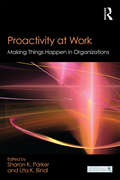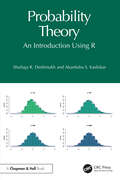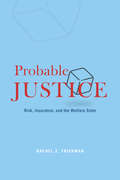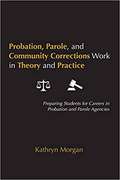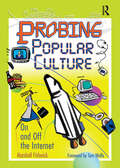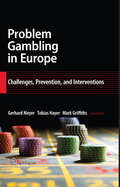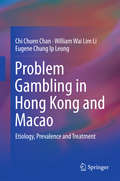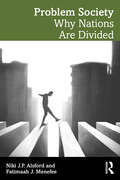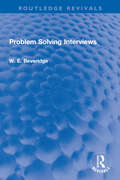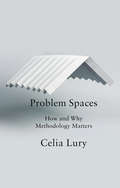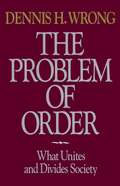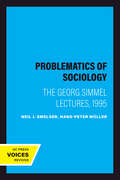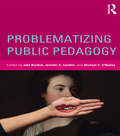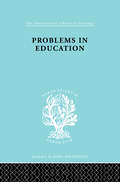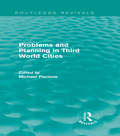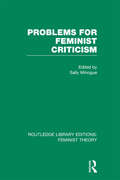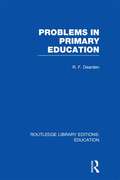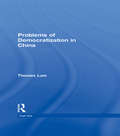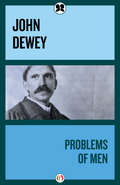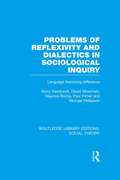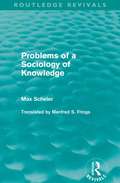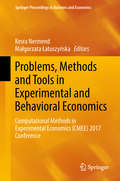- Table View
- List View
Proactivity at Work: Making Things Happen in Organizations (Organization and Management Series)
by Sharon K. Parker Uta K. BindlAs organizations grow increasingly complex and unpredictable, the topic of proactivity at work has become of great importance for contemporary workplaces. Proactivity drives performance and innovation of teams and organizations and boosts individuals’ well-being and careers. When individuals are proactive, they use their initiative at work to bring about a better future. They scan for opportunities, persist until change is achieved, and take charge to prevent problems’ future reoccurrence. In this book, leading scholars on proactivity from across North America, Europe, Asia, and Australia explore how, why, and when individuals are motivated to initiate change within their organizations or themselves and examine the consequences of various forms of proactivity at work. Individual chapters explore specific concepts of proactivity, such as proactive voice, job crafting, and career proactivity, as well as highlight individual processes and organizational dynamics that underlie successful proactivity at work. By providing insights on key advances and future directions for proactivity theory, research, and practice, Proactivity at Work synthesizes what we already know and identifies what we still need to learn about making things happen at work. This book is relevant to all those involved or interested in Work Psychology and Business, including Human Resource Management scholars.
Probability Theory: An Introduction Using R
by Shailaja R. Deshmukh Akanksha S. KashikarThis book introduces Probability Theory with R software and explains abstract concepts in a simple and easy-to-understand way by combining theory and computation. It discusses conceptual and computational examples in detail, to provide a thorough understanding of basic techniques and develop an enjoyable read for students seeking suitable material for self-study. It illustrates fundamental concepts including fields, sigma-fields, random variables and their expectations, various modes of convergence of a sequence of random variables, laws of large numbers and the central limit theorem. Computational exercises based on R software are included in each Chapter Includes a brief introduction to the basic functions of R software for beginners in R and serves as a ready reference Includes Numerical computations, simulation studies, and visualizations using R software as easy tools to explain abstract concepts Provides multiple-choice questions for practice Incorporates self-explanatory R codes in every chapter This textbook is for advanced students, professionals, and academic researchers of Statistics, Biostatistics, Economics and Mathematics.
Probability and Forensic Evidence: Theory, Philosophy, and Applications
by Ronald Meester Klaas SlootenThis book addresses the role of statistics and probability in the evaluation of forensic evidence, including both theoretical issues and applications in legal contexts. It discusses what evidence is and how it can be quantified, how it should be understood, and how it is applied (and, sometimes, misapplied). After laying out their philosophical position, the authors begin with a detailed study of the likelihood ratio. Following this grounding, they discuss applications of the likelihood ratio to forensic questions, in the abstract and in concrete cases. The analysis of DNA evidence in particular is treated in great detail. Later chapters concern Bayesian networks, frequentist approaches to evidence, the use of belief functions, and the thorny subject of database searches and familial searching. Finally, the authors provide commentary on various recommendation reports for forensic science. Written to be accessible to a wide audience of applied mathematicians, forensic scientists, and scientifically-oriented legal scholars, this book is a must-read for all those interested in the mathematical and philosophical foundations of evidence and belief.
Probable Justice: Risk, Insurance, and the Welfare State
by Rachel Z. FriedmanDecades into its existence as a foundational aspect of modern political and economic life, the welfare state has become a political cudgel, used to assign blame for ballooning national debt and tout the need for personal responsibility. At the same time, it affects nearly every citizen and permeates daily life—in the form of pension, disability, and unemployment benefits, healthcare and parental leave policies, and more. At the core of that disjunction is the question of how we as a society decide who should get what benefits—and how much we are willing to pay to do so. Probable Justice traces a history of social insurance from the eighteenth century to today, from the earliest ideas of social accountability through the advanced welfare state of collective responsibility and risk. At the heart of Rachel Z. Friedman’s investigation is a study of how probability theory allows social insurance systems to flexibly measure risk and distribute coverage. The political genius of social insurance, Friedman shows, is that it allows for various accommodations of needs, risks, financing, and political aims—and thereby promotes security and fairness for citizens of liberal democracies.
Probation, Parole, and Community Corrections Work in Theory and Practice: Preparing Students for Careers in Probation and Parole Agencies
by Kathryn MorganProbation, Parole, and Community Corrections Work in Theory and Practice is a comprehensive examination of probation, parole, and other correctional practices that are alternatives to incarceration. The textbook covers important topics related to community corrections, including an overview of correctional programs used as alternatives to incarceration (probation, parole, home confinement, and electronic monitoring); the history and development of community correctional practices; current controversies; and legal issues affecting probation, parole, and community correctional practices. <P><P> Critical thinking questions in each chapter along with case studies and case scenarios reflect the book’s balanced approach to examining community corrections. The emphasis on developing problem solving, report writing, and critical thinking skills makes this book an excellent choice for students who desire to enter the field. Students completing a course using this book will have not only an understanding of the dynamic forces of community corrections but also the skill competence that prepares them for entry-level positions in community corrections agencies.
Probing Popular Culture: On and Off the Internet
by Marshall Fishwick"When it comes to seeing depth and lateral connections in the development of popular culture, nobody exceeds Marshall Fishwick." -Canadian Psychology In Probing Popular Culture: On and Off the Internet, one of the leading authorities in American and popular culture studies presents an eye-opening examination o
Problem Gambling in Europe
by Mark Griffiths Gerhard Meyer Tobias HayerProblem Gambling in Europe Challenges, Prevention, and Interventions Edited by Gerhard Meyer, University of Bremen, Germany Tobias Hayer, University of Bremen, Germany Mark Griffiths, Nottingham Trent University, United Kingdom As a leisure activity, gambling dates back to ancient times. More recently, the surge in avenues for gambling--casinos, sports betting, lotteries, and remote media (e.g.,Internet, mobile phone, interactive television) among them--finds growing numbers of people losing control over their gambling behaviour, usually at great personal and financial expense. Problem Gambling in Europe is the first book to offer a robust international knowledge base compiled by an interdisciplinary panel of researchers in gambling behaviour. Reports from 21 countries throughout Western, Eastern, Northern, and Southern Europe reveal wide variations in types of wagering activities, participation by populations, social and criminal consequences related to pathological gambling, the extent to which governments acknowledge the problem, and efforts to control it (often with the involvement of the gaming industries). For each country, noted experts discuss: Current legislation regulating gambling. Forms of gambling and their addictive potential. Participation rates and demographics. Prevalence of pathological gambling. National policies to address problem gambling. Prevention strategies and treatment methods. Problem Gambling in Europe brings insight and clarity to a widespread and complex phenomenon, and will be of considerable interest to all parties working to reduce their negative effects: social science researchers in addictions, gambling behaviour, and public health; clinical, social, and health psychologists and psychiatrists; treatment practitioners; the gaming industry; regulators; and policy makers.
Problem Gambling in Hong Kong and Macao
by Chi Chuen Chan William Wai Lim Li Eugene Chung Ip LeungThis book critically examines the psychology of gambling in Hong Kong and Macao. Covering the history of gambling and its development in the two jurisdictions, it highlights the prevalence and status quo of problem gambling, the theoretical perspectives on the etiology of gambling disorder, and the treatment of problem gambling. The book also introduces a personality and pathways development model of Chinese problem gamblers and concludes with outlooks on the future of gambling in Hong Kong and Macao.
Problem Society: Why Nations Are Divided
by Niki J.P. Alsford Fatimaah J. MenefeeProblem Society is an essential introduction to the many facets of divided societies. It examines the complexities of how and why ancient grievances and new conflicts coexist with unprecedented connectivity and develops students’ understanding of the daily lived experience of people in cultural, economic, and political landscapes affected by global shifts.Structured around critical problems facing global societies in transition, it equips students with analytical tools to interpret the complex world around them. It provides a multidisciplinary exploration of the historical contexts of nation-state building and the politics of divided nations and illuminates the geopolitical upheavals of the late twentieth and early twenty-first centuries. Illustrated by diverse case studies and vignettes, it takes readers on a chapter-by-chapter journey through key topics including balancing interests and needs at different societal levels, from the global to local; shifts in the tension between individualism and collectivism; obstacles to problem-solving and decision-making; causes of, and ways of managing and resolving, conflict; the challenge of ensuring effective, accountable, and transparent governance; peacekeeping forms and the ethical and political dilemmas they entail; establishing and verifying truth in an era of misinformation; and balancing privacy and security amid widespread surveillance.Borne from the authors’ extensive experience of teaching and collaborating with students to bridge theory, concepts, and issues with their real-world experience, pedagogical features include definitions of key concepts, activities, reflection questions, further reading, as well as carefully curated suggestions for films and docuseries, to deepen students’ understanding of contemporary international politics.Problem Society is an engaging introduction to the intricate dynamics of a rapidly changing, interconnected world for students of sociology, politics, international relations, human geography, anthropology, area studies, and conflict resolution.
Problem Solving Interviews (Routledge Revivals)
by W. E. BeveridgeFirst published in 1968, Problem Solving Interviews explores different elements relating to conversations concerned with finding a solution to a particular problem. The book begins first by examining the role of the problem-solving interviewer, before exploring in detail what an interview is. It looks at the significance of different attitudes in shaping behaviour and highlights the importance of considering the attitudes of both the interviewer and the respondent. This leads on to a consideration of bias, including where it comes from, how it can affect the interview, and whether its impact can be eliminated or reduced. The book also covers carrying out and learning how to interview, and includes close analysis of three example interviews.
Problem Spaces: How and Why Methodology Matters
by Celia LuryIn this innovative book, Celia Lury argues that the time has come for us to explore the world not only with new methods, but with a new approach to methodology itself. Fundamental changes are taking place in how we produce knowledge, how we communicate it and, indeed, what we consider to be knowledge. These changes demand innovative and creative responses to research questions. Lury's rethinking of the nature of social inquiry starts by reconceptualizing the 'problem space'. Problems are not static or a 'given'; rather, they are created and continually recomposed as part of the methodological process itself. Following the line of thought that methods are practices that articulate as much as capture a social problem, Lury further develops the notion of compositional methodology to think through its implications. With remarkable fluency, the book draws into conversation a range of hot-button issues, both longstanding and novel, from observation, reflexivity, recursive measurement and feminist methodologies, to participation, context, datafication and platformization. Always with an eye to the methodological potential of new trends, the book provides a strong challenge to much received wisdom and argues that a combination of techniques can contribute to better understanding of the problem spaces we all inhabit.
Problem of Order: What Unites and Divides Society
by Dennis Wrongtwentieth century, many fear that the bonds holding civil society together have come undone. Yet, as the noted scholar Dennis Wrong shows us, our generation is not alone in fearing a breakdown of social ties and a descent into violent conflict. Modern masters such as Hobbes, Rousseau, Freud, Mead, Parsons, Marx, Durkheim, and Weber tried to understand what in human nature provokes social cooperation and solidarity and what arouses conflict and chaos. To minimize discord and promote civility, society must grasp the psychological and sociological elements of human nature involved in attaining that end. The author affords an illuminating perspective on our own efforts to create a well-functioning system that allows for productive and meaningful lives and remains open to change and growth. This important book reveals the individual and social processes that offer potential for reconciliation in the present and the future.
Problematics of Sociology: The Georg Simmel Lectures, 1995
by Neil J. SmelserThese skillfully written essays are based on the Georg Simmel Lectures delivered by Neil J. Smelser at Humboldt University in Berlin in the spring of 1995. A distillation of Smelser's reflections after nearly four decades of research, teaching, and thought in the field of sociology, the essays identify, as he says in the first chapter, ". . . some central problematics—those generic, recurrent, never resolved and never completely resolvable issues—that shape the work of the sociologist."Each chapter considers a different level of sociological analysis: micro (the person and personal interaction), meso (groups, organizations, movements), macro (societies), and global (multi-societal). Within this framework, Smelser covers a variety of topics, including the place of the rational and the nonrational in social action and in social science theory; the changing character of group attachments in post-industrial society; the eclipse of social class; and the decline of the nation-state as a focus of solidarity.The clarity of Smelser's writing makes this a book that will be welcomed throughout the field of social science as well as by anyone wishing to understand sociology's essential characteristics and problems.
Problematizing Public Pedagogy
by Jennifer A. Sandlin Jake Burdick Michael P. O’MalleyThe term ‘public pedagogy’ is given a variety of definitions and meanings by those who employ it. It is often used without adequately explicating its meaning, its context, or its location within differing and contested articulations of the construct. Problematizing Public Pedagogy brings together renowned and emerging scholars in the field of education to provide a theoretical, methodological, ethical, and practical ground from which other scholars and activists can explore these forms of education. At the same time it increases the viability of the concept of public pedagogy itself. Beyond adding a multifaceted set of critical lenses to the genre of public pedagogy inquiry and theorizing, this volume adds nuance to the broader field of education research overall.
Problems In Education Ils 232 (International Library of Sociology)
by Brian HolmesFirst published in 1998. Routledge is an imprint of Taylor & Francis, an informa company.
Problems and Planning in Third World Cities (Routledge Revivals)
by Michael PacioneWhen this title was first published in 1981, growing concern for the future of cities and those who inhabited them, stimulated by trends in global urbanisation, had resulted in much emphasis being placed on a problem-solving approach to the study of the city. The chapters in this edited collection, a companion to Urban Problems and Planning in the Developed World (Routledge Revivals, 2013), consider the problems and planning activities in a number of cities across the world. Varied case-studies, including Mexico City, Bogota and Shanghai, reflect the differing economic, cultural and political regimes of the modern world and ensure the continued value of this comprehensive work.
Problems for Feminist Criticism (Routledge Library Editions: Feminist Theory)
by Sally MinogueFeminist criticism has come a long way in the last twenty years. Its development has been rapid, its snowball progress picking up elements of structuralism, deconstruction and psychoanalytic criticism; just as rapidly it has been shedding its own early theories and methodologies. Now it is a critical orthodoxy with its own established canonical texts. Now is the time, then, to begin to question that orthodoxy. In Problems for Feminist Criticism five women critics seek to do that, in a spirit of enquiry whose central point of focus is the literature for which feminist critics have offered a re-reading. By reference to a wide range of writers, from Milton to the contemporary poet, with a strong emphasis on the nineteenth-century novel, the contributors ask what we may be losing from literature by adopting the feminist orthodoxy. Each chapter provides a survey of feminist critical approaches to its subject and highlights the inherent problems. The book frees the way forward for critics who have found much that is stimulating and revealing in feminist approaches to literature, but who find its proscriptiveness potentially reductive. It shows how literature may have the flexibility to absorb and benefit from new critical approaches, whilst still retaining its own life, never quite to be contained in criticism’s theories and methodologies.
Problems in Primary Education (Routledge Library Editions: Education)
by R F DeardenThe first part of the book discusses aims, who should determine them and how they might be determined. The second part discusses some more specific topics of learning and teaching, such as learning how to learn, the integrated day and the use of competition. The author distinguishes three broad levels of thought in looking at schools: the details of choice and decision; the general principles which are, or ought to be, guiding that detailed practice; and the theoretical commentaries on the guiding principles available from the various disciplines which constitute the study of education.
Problems of Democratization in China (East Asia)
by Thomas G. LumFirst published in 2000. Routledge is an imprint of Taylor & Francis, an informa company.
Problems of Life
by Leon Trotsky Lev D. Trotsky Z. VengerovaFrom the introduction: Trotsky's great merit is the exceptionally wide scope of his vision. He unites the destructive elements of a revolutionary mind with the zeal of a master-builder intent on constructive work. The world knows him as one of the implacable Bolshevist leaders, but Problems of Life, a book published only a few months ago in Russian, shows Trotsky in a very different light. It shows that in the middle of his military and militant activities he devotes much of his energy to the peaceful work of social reconstruction, and that the centre of the problem lies for him in culture, education and morals. His book deals with the interests, duties and morals of daily life, and shows Bolshevism and the Bolshevist spirit from a new constructive side.
Problems of Men
by John DeweyAlthough primarily addressed to the general reader, the introduction and the last chapters of this work strike straight at reactionary philosophers who obstruct the philosophers who are honest searchers for wisdom.
Problems of Reflexivity and Dialectics in Sociological Inquiry: Language Theorizing Difference (Routledge Library Editions: Social Theory)
by David Silverman Maurice Roche Barry Sandywell Paul Filmer Michael PhillipsonThis is a work of social theory and philosophy which seeks to make the constitution of social theory a ‘social’ activity. It is essentially a collaborative text, by five authors, committed to a re-awakening of some of the forgotten dimensions of social theorizing. The collaborative work was originally occasioned by an attempt to analyse the notion of social stratification and its treatment in the sociological tradition. The authors’ main concern here is with the nature of social theorizing, and in particular the ‘difference’ between Self and Other, being and beings, Language and Speech. The papers in the book focus on themes that are fundamental to the sense of inquiry and tradition which they are concerned to display. The themes discussed include speech, Language, Identity, Difference, Critical Tradition, Community, Metaphor, Dialectics, Observing and Reading.
Problems of Resettlement on Saipan, Tinian and Rota, Mariana Islands (Occasional Historical Papers Series No. #7)
by Neal M. BowersInvestigation into the problems associated with re-establishing a sustainable economy in the war-ravaged Northern Mariana Islands.
Problems of a Sociology of Knowledge (Routledge Revivals)
by Max SchelerFirst Published in 1980, Manfred S. Frings’ translation of Problems of a Sociology of Knowledge makes available Max Scheler’s important work in sociological theory to the English-speaking world. The book presents the thinker’s views on man’s condition in the twentieth-century and places it in a broader context of human history. This book highlights Scheler as a visionary thinker of great intellectual strength who defied the pessimism that many of his peers could not avoid. He comments on the isolated, fragmented nature of man’s existence in society in the twentieth century but suggests that a ‘World-Age of Adjustment’ is on the brink of existence. Scheler argues that the approaching era is a time for the disjointed society of the twentieth-century to heal its fractures and a time for different forms of human knowledge to come together in global understanding.
Problems, Methods and Tools in Experimental and Behavioral Economics: Computational Methods in Experimental Economics (CMEE) 2017 Conference (Springer Proceedings in Business and Economics)
by Kesra Nermend Małgorzata ŁatuszyńskaThese proceedings highlight research on the latest trends and methods in experimental and behavioral economics. Featuring contributions presented at the 2017 Computational Methods in Experimental Economics (CMEE) conference, which was held in Lublin, Poland, it merges findings from various domains to present deep insights into topics such as game theory, decision theory, cognitive neuroscience and artificial intelligence. The fields of experimental economics and behavioral economics are rapidly evolving. Modern applications of experimental economics require the integration of know-how from disciplines including economics, computer science, psychology and neuroscience. The use of computer technology enhances researchers’ ability to generate and analyze large amounts of data, allowing them to use non-standard methods of data logging for experiments such as cognitive neuronal methods. Experiments are currently being conducted with software that, on the one hand, provides interaction with the people involved in experiments, and on the other helps to accurately record their responses. The goal of the CMEE conference and the papers presented here is to provide the scientific community with essential research on and applications of computer methods in experimental economics. Combining theories, methods and regional case studies, the book offers a valuable resource for all researchers, scholars and policymakers in the areas of experimental and behavioral economics.
